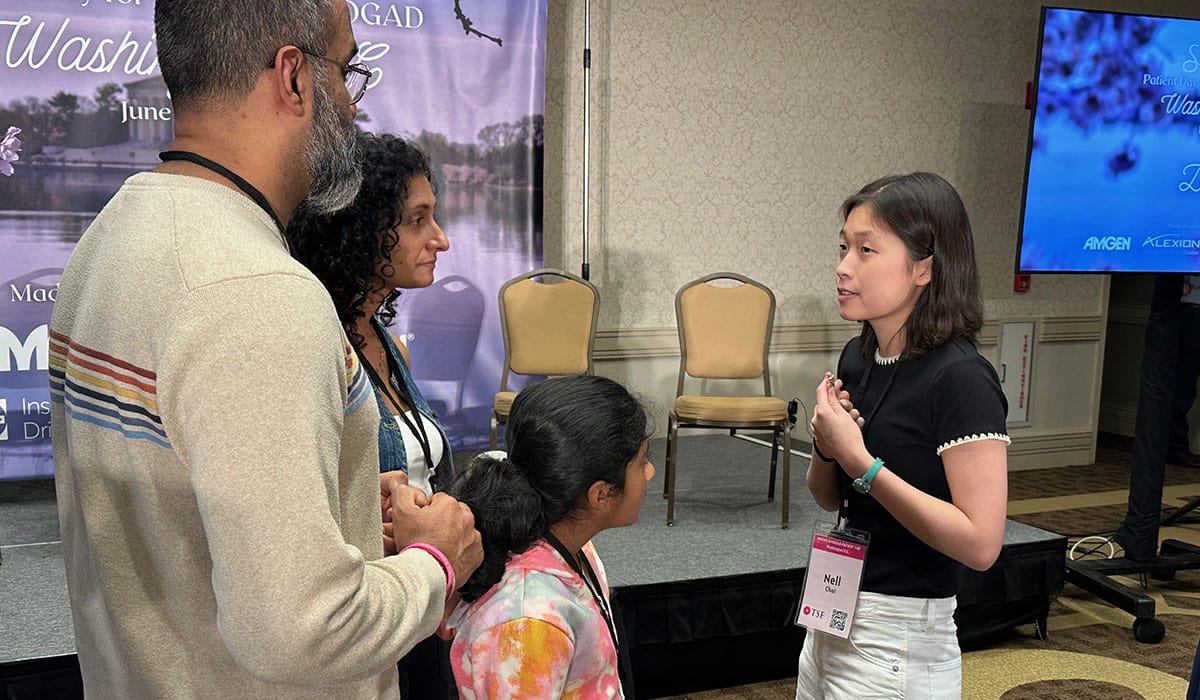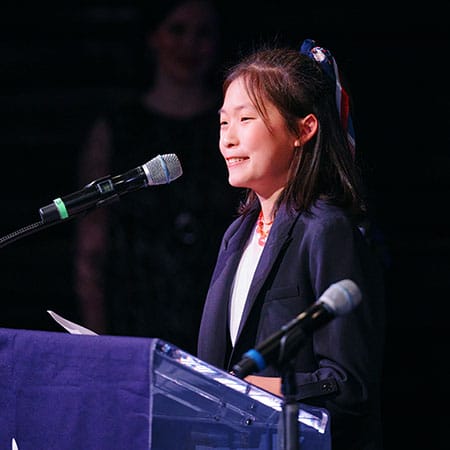EMPOWERING KIDS TO NAVIGATE ILLNESS BY SHARING HER STORY

Meet Daily Point of Light Award honoree Nell Choi. Read her story, and nominate an outstanding volunteer or family as a Daily Point of Light.
Nell Choi is a true trailblazer. At just 9 years old, she came down with serious flu-like symptoms. When doctors discovered major inflammation in her brain stem, they knew something significant was going on. Nell was diagnosed with a rare neurological condition called neuromyelitis optica (NMO), and her lifelong battle against the disease began.
During the worst of her experience with NMO, Nell felt isolated and confused over what she was going through. Previously an active lacrosse player, she was now experiencing long bouts of hospitalization and had trouble verbally expressing herself. But it was during this time that she found tremendous power in putting pen to paper. By journaling, Nell was able to emotionally process her experience and release some of the angst she was feeling. At 10 years old, she wrote My Hospital Story to combat those feelings of loneliness.
The book, which chronicles her life being thrown upside down by a mysterious illness, was such a success that Nell partnered with Children’s National Hospital, where she received treatment. It’s now distributed to some newer medical professionals in their medical internship program to give them an idea of what treatment is like from a kid’s perspective. Nell also provides several children going through treatment with the book, giving them not only someone to relate to when they’re experiencing medical struggles, but also an inspirational guide to remind them they can make it through hardships, too.

Now 17, Nell is a beacon in pediatric rare disease advocacy. Since 2021, she has served as the first junior ambassador for the Sumaira Foundation, which is dedicated to raising awareness of rare neuroimmune conditions like NMO. She leads virtual support groups, moderates panels and speaks at conferences to raise awareness of pediatric rare disease challenges. She also shares copies of My Hospital Story on her monthly visits to the Children’s Inn at NIH, where she reads stories and does crafts with children participating in clinical trials.
With great updates in the treatment of her disease happening regularly, Nell is thriving on the cusp of adulthood. She’s even planning on moving away for college. But no matter what next steps Nell takes in her life, her willingness to share her story to help others demonstrates the true meaning of volunteerism.
What inspired you to get started with this initiative?
When I was 9 years old, I was suddenly diagnosed with a rare neurological condition called neuromyelitis optica. That led me to being hospitalized for about four or five weeks, and it was a pretty scary time for me. It pretty much felt like my whole life was turned upside down, and I felt very lost and alone. I ended up not being able to explain to anyone exactly how I was feeling, so that’s when I started turning to writing. I would journal every day, and that was my way of processing all that had happened to me. I felt like the journal sort of transformed itself into the idea for a book.
Tell us about your volunteer role with My Hospital Story.
I remember being in the hospital doing physical therapy in the hallways. I would see other kids in their rooms sitting alone with their IV poles next to them, and I always wanted to talk to them, connect with them and help each other feel a little bit less alone. That’s where the idea of the book came in. I’ve published the book, and my main target audience is children’s hospitals across the country.
What inspires you to volunteer?
Seeing even just the little impact that I can have brings me so much joy. Every time I volunteer specifically with my book, I feel like it’s a full circle moment, because I can sometimes see myself in the people I’m interacting with. I felt very lost and scared. Being mostly on the other side of it now and looking back, it just brings me a lot of purpose for all the struggles that I’ve been through personally.
What are your long-term plans or goals for the organization?
One thing that I would love to do is do an adaptation where it becomes a type of journal prompt book to help other kids harness the power of journaling that helped me get through my own time of hardship.
What’s been the most rewarding part of your work?
The face-to-face interactions that I get with patients and families when they tell me how much the book meant to them. Or that it made them laugh, made them cry or gave them a strong emotion – that’s so rewarding. Also, my neuropsychologist gave out a bunch of copies to a couple of his new patients, and hearing that feels super rewarding.
Why is it important for others to get involved with causes they care about?
First of all, you will be so much happier. I think it’s so easy to just get caught up in daily life. I like to call it inertia, where you’re just going through the motions and not thinking or feeling, but when you step back and you choose to do something that you truly do care about, it feels so good. You feel a sense of purpose, and you get to know yourself better and your community better.
Any advice for people who want to start volunteering?
I would say the first place to start is a combination of self-reflection and external reflection. For me, it was a lot of self reflection, understanding the challenges I’ve been through. Then it’s the day-to-day interactions of being the observer and noticing things in your community that you want to address. It’s a combination of knowing your strengths and your passions, and how you can apply those passions to address an issue.
What do you want people to learn from your story?
I think that any hardship that you’ve had can be a catalyst for you to do something that makes an impact on the lives of others. I would say that was a part of my healing process. I don’t think that it was a part of survival, per se, but to be able to move forward, and with the new reality of living with this disease, being able to help others is my drive to keep going forward.
Do you want to make a difference in your community like Nell? Find local volunteer opportunities.